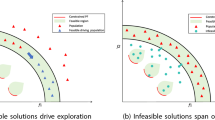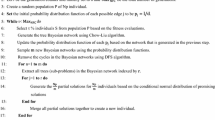Abstract
Encoding feasible solutions is one of the most important aspects to be taken into account in the field of evolutionary computation in order to solve search or optimization problems. This paper proposes a new encoding scheme for real-coded evolutionary algorithms. It is called partition based encoding scheme, and satisfies two restrictions. Firstly, each of the components of a decoded vector that conforms a candidate solution to a problem at hand belongs to a predefined interval. Secondly, the sum of the components of each of these decoded vectors is always equal to a predefined constant. The proposed encoding scheme inherently guarantees these constraints for all the individuals that are generated within the evolution process as a consequence of applying the genetic operators. Partition based encoding scheme is successfully applied to learning conditional probability tables for a given discrete Bayesian network topology, where each row of the tables must exactly add up to one, and the components of each row belong to the interval [0,1] as they are probability values. The results given by the proposed encoding system for this learning problem is compared to a deterministic algorithm and another evolutionary approach. Better results are shown in terms of accuracy with respect to the former one, and accuracy and convergence speed with respect to the later one.






Similar content being viewed by others
Explore related subjects
Discover the latest articles, news and stories from top researchers in related subjects.References
Abdul-Rahman O, Munetomo M, Akama K (2011) An improved binary-real coded genetic algorithm for real parameter optimization. In: Proceedings of third world congress on nature and biologically inspired computing, Salamanca, Spain, pp 149–156
Barrios D, Manrique D, Carrascal A (2003) Optimisation with real-coded genetic algorithms based on mathematical morphology. Int J Comput Math 80(3):275–293
Beaser E, Schwartz JK, Bell CB, Solomon EI (2011) Hybrid genetic algorithm with an adaptive penalty function for fitting multimodal experimental data: application to exchange-coupled non-kramers binuclear iron active sites. J Chem Inf Model 51(9):2164–2173
Chomsky N (1956) Three models for the description of language. IEEE Trans Inform Theory 2(3):113–124
Choubey NS (2010) A novel encoding scheme for traveling tournament problem using genetic algorithm. Int J Comput Appl 2:79–82
Coello CA (2008) Constraint-handling techniques used with evolutionary algorithms. In: Proceedings of the 2008 GECCO conference companion on genetic and evolutionary computation, Atlanta, USA, pp 2445–2466
Couchet J, Manrique D, Ríos J, Rodriguez-Paton A (2007) Crossover and mutation operators for grammar-guided genetic programming. Soft Comput 11(10):943–955
De Jong KA (2006) Evolutionary computation: a unified approach. MIT press, Cambridge.
Dong L, Liu G, Yuan S, Li Y, Li Z (2007) Classifier learning algorithm based on genetic algorithms. In: Proceedings of ICICIC’07 second international conference on innovative computing, information and control pp 126–129
Font JM, Manrique D, Ríos J (2010) Evolutionary construction and adaptation of intelligent systems. Exp Syst Appl 37(12):7711–7720
Font JM, Manrique D, Pascua E (2011) Grammar-guided evolutionary construction of bayesian networks. In: Foundations on natural and artificial computation. Lecture Notes in Computer Science 6686:60–69
Garcia-Arnau M, Manrique D, Ríos J, Rodríguez-Paton A (2007) Initialization method for grammar-guided genetic programming. Knowl Based Syst 20(2):127–133
Griner R, Su X, Shen B, Zhou W (2005) Structural extension to logistic regression: discriminative parameter learning of belief net classifiers. Mach Learn 59(3):297–322
Kari L, Rozenberg G (2008) The many facets of natural computing. Commun ACM 51(10):72–83
Koza JR (1992) Genetic programming: on the programming of computers by means of natural selection. MIT Press, Cambridge, MA
Larrañaga P, Poza M, Yurramendi Y, Murga RH, Kuijpers CM (1996) Structure learning of Bayesian networks by genetic algorithms: a performance analysis of control parameters. IEEE Trans Pattern Anal 18(9):912–926
Lichman M (2013) UCI Machine Learning Repository. Irvine, CA: University of California, School of Information and Computer Science. http://archive.ics.uci.edu/ml
Loiacono D, Cardamone L, Lanzi P (2011) Automatic track generation for high-end racing games using evolutionary computation. IEEE Trans Comp Intel AI 3(3):245–259
Manning CD, Raghavan P, Schütze H (2008) Introduction to information retrieval. Cambridge University Press, Cambridge
Nowling RJ, Mauch H (2011) Priority encoding scheme for solving permutation and constraint problems with genetic algorithms and simulated annealing. In: Proceedings of the eighth international conference on information technology: New Generations, ITNG 2011, Las Vegas, USA, pp 810–815
Russel SJ, Norvig P (2009) Artificial intelligence: a modern approach, 3rd edn. Prentice Hall, Englewood Cliffs, NJ
Simon D (2013) Evolutionary optimization algorithms. Wiley, Hoboken
Su J, Zhang H, Ling CX, Matwin S (2008) Discriminative parameter learning for bayesian networks. In: Proceedings of the 25th international conference on machine learning, Helsinki, Finland, pp 1016–1023
The University of Waikato (2014) Weka http://www.cs.waikato.ac.nz/ml/weka. Accessed July 2014
Whigham P (1995) Grammatically-based genetic programming. In: Proceedings of the workshop on genetic programming: from theory to real-world applications 16, pp 33–41
Yu X, Gen M (2010) Introduction to evolutionary algorithms. Springer, London
Author information
Authors and Affiliations
Corresponding author
Rights and permissions
About this article
Cite this article
Font, J.M., Manrique, D., Ramos-Criado, P. et al. Partition based real-valued encoding scheme for evolutionary algorithms. Nat Comput 15, 477–492 (2016). https://doi.org/10.1007/s11047-015-9505-6
Published:
Issue Date:
DOI: https://doi.org/10.1007/s11047-015-9505-6
Keywords
- Encoding scheme
- Encoding constraints
- Real-valued evolutionary algorithms
- Discrete Bayesian networks
- Conditional probability tables




